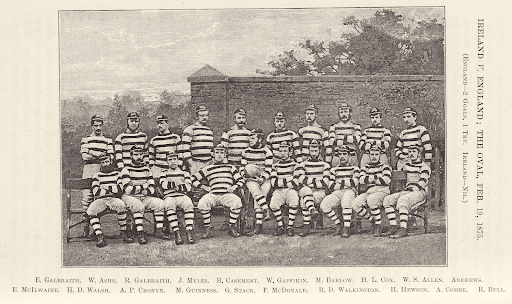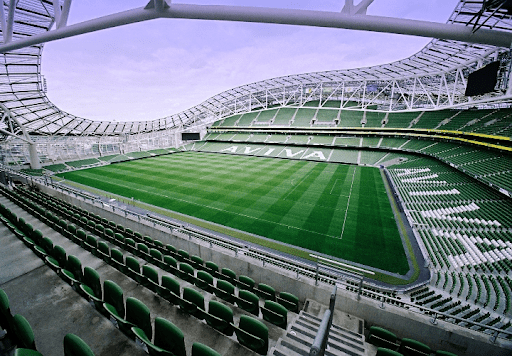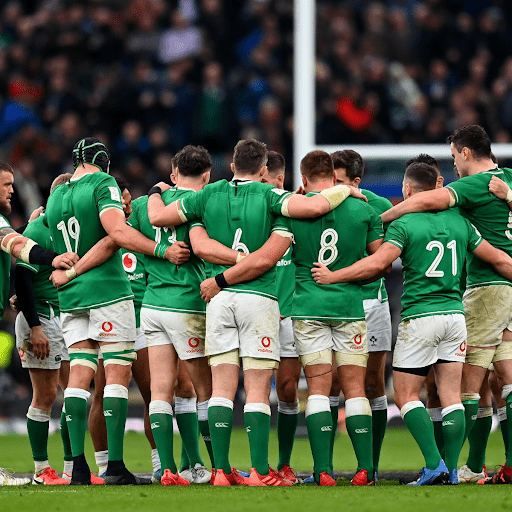Updated On: November 07, 2023 by Gabbi Ferrin
The History of Irish Rugby: Celebrating Six Nations Season
Updated On: February 14, 2022
Irish rugby is steeped in tradition, pride, and skill. Its camaraderie, sportsmanship and undeniable sense of unity have captured the hearts of many – from players to spectators alike.
But where did this strong sense of community come from? The much-loved sport has an impressive history – from the beginnings of the game in Trinity and NIFC right through to the ’48 Grand Slam, the triple crowns of the 80s and the Grand Slam success of recent years.
To celebrate the highly anticipated Six Nations season, let’s take a closer look at how rugby in Ireland got to where it is today.

A Snapshot of Irish Rugby History
Irish rugby dates all the way back to 1854 when a group of students at Dublin University who had learned rugby at English public schools introduced the sport to their classmates. From here, they decided to create the first rugby club in Ireland. Fast-forward 168 years, Dublin University Football Club (DUFC) still stands as the rugby union club of the University of Dublin, Trinity College.
Over the years, the game has only continued to grow in popularity. By 1875, there were eight established clubs across the country, these being: NIFC (1868); Wanderers (1869); Queen’s University (1869); Lansdowne (1873); Dungannon (1873); Co. Carlow (1873); UCC (1874); and Ballinasloe (1875).
In 1879, the Irish Rugby Football Union (IRFU) was formed, and to this day, remains the official governing body of Irish rugby.
For most of its history, rugby in Ireland was viewed mainly as an amateur game. But since 1999, it has become an ‘open’ game, with both amateur and professional teams playing.
Now, the large professional teams in Ireland are essentially made up of each of the provinces, these being: Munster, Leinster, Ulster and Connaught. These primarily concentrate on the Heineken Cup and the Magners League, which are European competitions, rather than on competitions within Ireland.
The Ireland rugby teams have cemented themselves as forces to be reckoned with, with some of Ireland’s most memorable SIx Nations wins being two Grand Slams, four Championship titles and five Triple Crowns since 2000.
Like we said – the sport has an impressive history!

Irish Rugby Football Union
The Irish Rugby Football Union is the governing body for the sport of rugby on the island of Ireland.
The IRFU’s home ground is famously located at Aviva Stadium, where adult men’s Irish rugby union international matches are played. In addition, the Union also owns the Kingspan Stadium (formerly known as Ravenhill) in Belfast, Thomond Park in Limerick and a number of grounds in provincial areas that have been rented to clubs.
Initially, there were two unions:
- The Irish Football Union, which had jurisdiction over clubs in Leinster, Munster and parts of Ulster and was founded in December 1874
- The Northern Football Union of Ireland, which controlled the Belfast area and was founded in January 1875
The Irish Football Union and the Northern Football Union of Ireland amalgamated in 1879 based on the following terms:
- A Union to be known as the Irish Rugby Football Union was to be formed for the whole country
- Branches were to be formed in Leinster, Munster and Ulster
- The Union was to be run by a Council of eighteen, made up of six from each province
Now, all four provinces play at the senior level as members of the United Rugby Championship.

Ireland’s Success at Six Nations Championship
The main event in every rugby lover’s calendar is undoubtedly the Six Nations Championships, which are held each Spring between Ireland, England, Scotland, Wales, France and Italy. Until 2000 and the arrival of Italy, the competition was previously known as the Five Nations.
Since the Five Nations became Six, Ireland has taken part in some all-time classic matches. Some of the most notable ones include:
- France 25-27 Ireland (2000)
- Ireland 43-13 England (2007)
- Wales 15-17 Ireland (2009)
- France 20-22 Ireland (2014)
- England 15-24 Ireland (2018)
On top of this success, Ireland reached number 1 in the World Rugby Rankings for the first time in 2019, with eleven former Ireland players having been inducted into the World Rugby Hall of Fame.
We can’t wait to see what more they achieve in this year’s Six Nations! We have a feeling that the history of Irish rugby is only going to get better and better.






